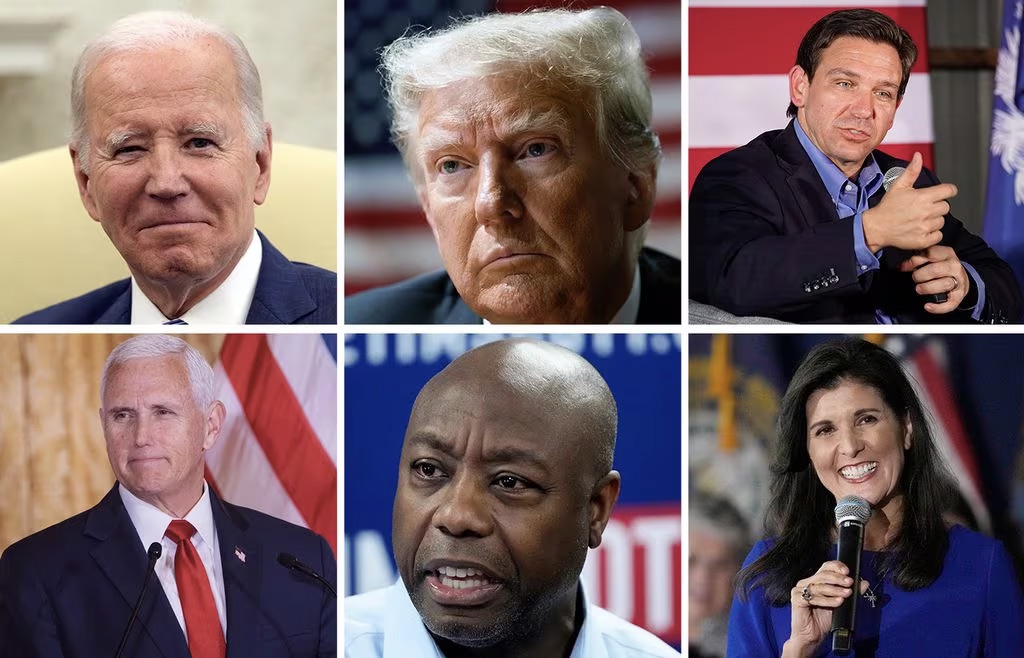
Candidates for president in 2024 include, from top left, Joe Biden, Donald Trump, Ron DeSantis, Mike Pence, Tim Scott, and Nikki Haley. (Picture: The Boston Globe)
As the United States braces for general election this year, the Democratic and Republican parties are engaging in extraordinarily fierce legal and cognitive battles. Disputes over Donald Trump’s candidacy, inflation, illegal immigration, the Ukraine crisis and the Palestine-Israel conflict dominate political debates and media coverage, while China topics seem to have taken a backseat.
The meeting in San Francisco between Chinese and American leaders has played a critical role in stopping the free fall of relations and has begun to stabilize bilateral ties — more or less contributing to a cooling-down of China-related debates on the political campaign trail. For the Biden administration, stabilizing relations with China is conducive to its attempts to ease inflation at home, control the fentanyl crisis, promote an energy transition and concentrate on coping with overseas conflicts, but it remains to be seen whether China policy will become a bonus point for Joe Biden’s bid for reelection to the White House.
Since there has been no fundamental change in the U.S. policy that takes China as a strategic competitor and resorts to containment and suppression, there is a political foundation for pushing tougher China policies in the United States. As the campaigns heat up, the influence of such domestic factors as Republican radicalism, congressional chaos and state government maneuvers may gradually present themselves.
First, the Biden administration, under electoral pressure, may adopt new measures to suppress China. For decades, the Republican Party has built a hawkish image for itself when it comes to national security. It seeks voter support by attacking the Democrats for their “weak” foreign policy. Before and after the general elections in 2020 and the midterm elections of 2022, the Republicans resorted to extreme anti-China rhetoric to woo voters, striving to suppress Democratic momentum. Although it didn’t work well, Republican politicians simply couldn’t stop. This time around, such Republican presidential candidates as Donald Trump and Florida Governor Ron DeSantis have taken “ultra-tough” stances on China. Both are dissatisfied with Biden’s practice of “precision decoupling” from China in the fields of economy and technology and claimed that to achieve U.S. economic independence, the two economies must be decoupled completely. These Republicans would revoke the permanent normal trade relations with China. Since both parties consider decoupling and “de-risking” to be useful tools in their political competition, Republican criticism of Biden’s economic policies may press the latter to come up with new protectionist moves in trade, investment, science and technology, which may take the form of harsher restrictions on trade and investment, together with new export controls.
Second, a pro-Taiwan and anti-China political clamor may induce Congress to pass new anti-China measures. Legislation involving Hong Kong, Taiwan and the Xinjiang Uygur autonomous region that has been passed by the U.S. Congress in the past few years have done lasting damage to China-U.S. relations.
Immediately after the start of the 118th Congress, Republican lawmakers, who had just regained control of the House of Representatives, introduced a series of anti-China bills — including the Taiwan Conflict Deterrence Act and the PROTECT Taiwan Act. Though such bills have yet to become law, their contents seriously violate the one-China principle and the three China-U.S. joint communiques. And they have drawn strong opposition from the Chinese government. America’s two parties are quarreling fiercely over such matters as budgets and appropriations, but they are closely aligned on providing military assistance to Taiwan.
After Taiwan’s elections, both the executive and legislative branches of the U.S. government show support for the newly elected politicians. Lai Ching-te, who calls himself a “worker for Taiwan independence,” was elected and will go all out to push forward a “de-sinicization” agenda and promote “incremental independence.” Relations with Beijing will not only be difficult to improve but may continue to deteriorate. With its pro-Taiwan, anti-China mindset, the domestic political atmosphere in the U.S. may lead Congress to pass the Taiwan bills by margins that will force Biden to sign them. If a China-U.S. confrontation over Taiwan escalates, Biden’s endeavor to install guardrails for stable bilateral ties may be frustrated.
Third, Republican-led “red” states may pass new anti-China measures. As a result of the U.S. government’s anti-China mobilization over the past few years, images of China as the “biggest threat” to the U.S. economy, security and way of life have been implanted into the minds of ordinary Americans. Such Republican-leaning states as Florida, Texas and Montana have passed a series of anti-China laws, including some restricting real estate purchases by Chinese nationals, restricting or prohibiting the use of TikTok and preventing public schools from establishing ties with “countries of concern” — meaning China. The formation of red states into an anti-China vanguard is part of the Republican Party’s electoral strategy.
On the other hand, “blue” states — California, for instance — are proactively engaged in pragmatic cooperation with China in such fields as economy, trade, people-to-people exchanges and climate change. In a year of general elections, red-state Republicans may propose sensational new measures to limit China-U.S. cooperation as a way of competing with the blue-state Democrats, especially in people-to-people exchanges.
Finally, the outcome of U.S. general election will bring new challenges to China-U.S. relations. Judging from the current state of affairs, there is a chance that former president Trump and President Biden could face off again in the elections. However, regardless whether Trump wins the Republican nomination, the Republican Party differs greatly from Biden and the Democratic Party when it comes to governing philosophy, including domestic matters and foreign policy involving China.
China doesn’t take sides on U.S. elections, nor would it intervene in them in any way, but the uncertainty that comes with such elections themselves are risks to China-U.S. relations. If a Republican takes over the White House in 2025, China needs to be ready for fresh challenges.